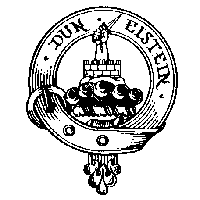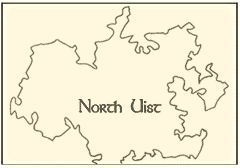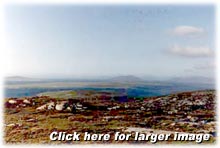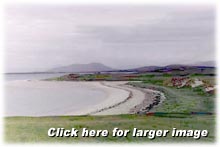
|
Part One: The Morrisons of the Outer Hebrides by Andrew Morrison
The history of the Morrisons is a
little different from that of most mainland clans. Our ancestors did not live in
a particular glen under the From at least the early 17th century our ancestors were not significant independent landholders, but occupied lands under the control of MacLeods or MacDonalds. That is why we often do not appear on clan maps at all. Similarly we had no proper recorded chief until Dr. John Morrison bowed to pressure from the clan society and the Lord Lyon in 1965. (The brieves were not really chiefs in the conventional sense; their jurisdiction and influence were broadly geographical and, above all, functional rather than, as it were, tribal.) This means fortunately that we did not suffer the confusion, common to so many clans, of being cleared from our own ancestral lands by our own ancestral sheep-loving chiefs.
There are of course many others whose surname is not Morrison (or one of its obvious variants) at all, but who are truly from the core group. This would include not only those who descend through a maternal line, but also many whose ancestors rarely if ever used the name. Surnames as we know them today were not used much in the Hebrides until recently. This is hardly surprising when people shared so few names. In Gaelic people were called by names which did more to distinguish them from their fellows. Thus a John Morrison might be in his native language, Iain Moireasdain of the clan mac Ghille Mhuire, which could also be rendered as John Gilmour, but would just as likely be known as Iain Gobha (John the Smith), Iain Dubh (John the dark-haired), Iain mac Alasdair (John the son of Alexander) and so on. When he arrived in North America and gave his name in patronymic form listing several unpronounceable generations, he might then have been asked where he came from. Consequently he might be known in the New World as John Harris or John Lewis, and be mistaken for a Welshman! John Morrison, John Gilmour, John Smith, John Black, John MacAllister, John Lewis might all be the same person. John Mackinnon and John MacVurich too, as we shall see later. The poet Iain Gobha, known also as Gobha na Hearadh or the Smith of Harris, would be rendered as John Morrison in English. Another poet, Ruaridh Dall, also known as an Clarsair Dall, the Blind Harper, was a Rory or Roderick Morrison. So, a John Morrison today might not be descended from the core clan, while a John Smith, Mary Lewis or Rod Harper was. That is one reason why a clan society will cheerfully welcome anyone who feels like a Morrison.
Why do we not have a name that sounds Gaelic? Well, to begin with one should point out that the form "Gilmour", an Anglicization of mac Ghille Mhuire, is perfectly common. But for me the most likely explanation is to be found in the fact that our ancestors were at the forefront of the Protestant Reformation in the Islands. This movement aimed to stamp out Catholic "superstition", which they felt included not only the cult of Saints but even the language in which they were cultivated. Some ministers of the new Presbyterian Kirk were probably not pleased that their name was the Gaelic for "Servant of Mary". I suspect that it is probably from this period that there developed legends about the origin of the clan linking us to Norse royalty (even giving us priority over our grander and more powerful neighbours, the MacLeods). The more flattering legends have naturally enjoyed great popularity, and have been enthusiastically promoted by clan societies on both sides of the Atlantic. However, the detail about an eponymous ancestor called Gilmoir, elder half-brother of Leod, appears to derive from a 19th century mistake by a Captain Thomas: the name he read as Gilmoir in a manuscript genealogy of the MacLeods in Dunvegan should have read "Olbhair" (i.e. Oliver). So much for our being descended from King Olaf the Black! Unfortunately a combination of ethnic and denominational prejudice predisposed people for a long time to embrace any story which played down the "Irish" and boosted the "Aryan" connection. *
*Incidentally there is nothing specifically Nordic about Calvinism, nor Celtic about Roman Catholicism. It was the Anglo-Normans who forced the Irish to become Romans, during the conquest of Edward I, which had the blessing of the only English pope. And theologically both the Jansenist Catholicism of modern Ireland and the Calvinist Presbyterianism of Knox are equally Augustinian and thus, one might argue, equally at odds with the native spirituality of the Celtic Church, from Pelagius on. While most Morrisons have certainly been Presbyterian since the Reformation, I was interested to see that the main building in St. Francis Xavier University in Nova Scotia, home of its Celtic Studies course, is named after a certain Archbishop Morrison. Meet the author, Andrew Morrison
Back to The Morrisons of the Outer Hebrides, Main Page Links: Internet Guide to North Uist, Scotland
|
Thursday, December 26th, 2019
Attention visitors: Tartans.com is back. Please note that this is a snapshot of the site as it existed nearly 20 years ago and you may encounter broken links; we are still combing through the site and correcting those as we find them. Please also note that some sections are currently not functional, primarily the discussion forums/clan chat boards.
|
** HOME - First Time Visitors - Glossary - - Contact Us ** Awards | Bibliography | Clan Calendar | Clan Chat | Clan Finder | History | Famous Scots | Genealogy | Great Hall of the Clans | Links | News and Features | Scots on the Net | Search | Site Map The Gathering of the Clans
Copyright 1995- Tartans.com - All Rights Reserved. |
 protection of a hereditary chief who led them on a
series of armed adventures in pursuit of his neighbour's cattle or to further the
dynastic or denominational ambitions of some big noise to the south.
protection of a hereditary chief who led them on a
series of armed adventures in pursuit of his neighbour's cattle or to further the
dynastic or denominational ambitions of some big noise to the south. It follows, therefore, that, in reconstructing
our past, the conventional clan model may obscure more than it enlightens. Our
best clues to that past come from a combination of oral and written tradition,
from the study of names and occupations, and from considering how these nuggets
fit into different contexts. Interesting questions would seem to include the
following:
It follows, therefore, that, in reconstructing
our past, the conventional clan model may obscure more than it enlightens. Our
best clues to that past come from a combination of oral and written tradition,
from the study of names and occupations, and from considering how these nuggets
fit into different contexts. Interesting questions would seem to include the
following:
